Impact Stories from Empowering Women and Girls Policy Area
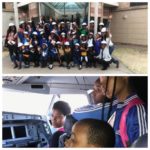
2013 seed grant winners hold 6th annual STEM expo
Fellow(s): Sandra Tererai, Nomso Kana, Chioniso Dube-Hachigonta
Country: South Africa
Cohort: 2013
Policy Area(s): Education Diplomacy/Mentoring, Empowering Women and Girls, Entrepreneurship, Professional Growth, Youth Engagement
This month, 2013 fellows of South Africa Sandra Tererai, Nomso Kana and Chioniso Dube-Hachigonta held a one-week STEM expo for 30 students representing South Africa, Zambia, Zimbabwe, and Eswatini. Taungana, a TechWomen 2013 seed grant-winning initiative, holds the annual event to connect rural girls to women mentors, educational resources and leading professionals in STEM fields.
Throughout the week, the students (called Ambassadors) were immersed in multiple STEM industries, visiting local universities, science museums, tech companies and a local power utility. During their day trips, the students received hands-on lessons on nuclear fission, cryptocurrency, aviation, coding, health sciences and the electricity generation process. During a visit to Uber, the Ambassadors got a behind-the-scenes look at the local Greenlight Hub, followed by a session on design thinking. The week also included a pitch night where Ambassadors pitched 90-second scientific solutions to social challenges.
Report Date...: 9/23/19
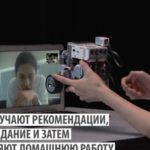
Fellow mentors Kyrgyzstan’s first all-women space program
Fellow(s): Zainab Saleem, Kyzzhibek Batyrkanova, Ainura Sagyn
Country: Kyrgyzstan, Pakistan
Cohort: 2017
Policy Area(s): Education Diplomacy/Mentoring, Empowering Women and Girls, Professional Growth, Youth Engagement
2017 fellow of Pakistan Zainab Saleem is mentoring members of the Kyrgyz Space Program, an all-women team that is building and launching Kyrgyzstan’s first satellite by 2020. The women, many of whom are not trained in STEM fields, meet with Zainab bi-weekly to gain skills in robotics, engineering and satellite technology. The core team, comprised of women ages 18-24, includes 2019 TechWomen Emerging Leader Kyzzhibek Batyrkanova.
Zainab holds a master’s degree in aerospace and aeronautical engineering and is currently working on groundbreaking SAR satellite technology at Finland’s ICEYE as an attitude and orbit control system engineer. She was introduced to the Kyrgyz team by 2017 fellow of Kyrgyzstan Ainura Sagyn after both fellows participated in TechWomen’s delegation trip to Uzbekistan.
After noticing that the space program’s nanosatellite was too far off from its target, Zainab began by dividing the women into teams – a mechanical team, an electronics team and an engineering team – and began developing a curriculum that would help the women reach their goal. “Zainab has greatly impacted our program,” says 2019 Emerging Leader Kyzzhibek. “We started with basics, like making a robot that could wipe the floor. That was fun. Now we’ll proceed with the basics of the cube satellite technology next month.”
Report Date...: 9/16/19
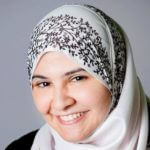
Fellow shares experience on empowering women in tech
Fellow(s): Dalia Shurrab
Country: Palestinian Territories
Cohort: 2018
Policy Area(s): Empowering Women and Girls, Professional Growth
This week, 2018 fellow of the Palestinian Territories Dalia Shurrab was the featured guest on a podcast, outlining the challenges and rewards of helping run Gaza’s first tech hub. Dalia is the social media coordinator at Gaza Sky Geeks, a coworking space and innovation hub that provides programming and mentorship for tech professionals.
The podcast, Latitude Adjustment, features guests from underrepresented communities throughout the world, hoping to inspire curiosity and cultural exchange. In the interview, Dalia spoke about how Gaza Sky Geeks developed its programs to educate women in tech, regardless of their background. One of Gaza Sky Geeks’ main programs, Code Academy, ensures that half of its participants are women. Dalia explained that if a woman is interested in the course but lacks the necessary requirements, Gaza Sky Geeks will invest in their professional development, assign them mentors and train them so they can match course criteria.
Report Date...: 9/16/19
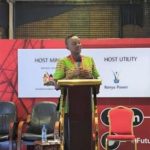
Fellow featured as keynote speaker at energy conference
Fellow(s): Charity Wanjiku
Country: Kenya
Cohort: 2017
Policy Area(s): Empowering Women and Girls, Entrepreneurship, Environmental Sustainability, Professional Growth
2017 fellow of Kenya Charity Wanjiku was a featured keynote speaker and panelist at the Future Energy East Africa conference, held this week in Lagos, Nigeria. Charity is the co-founder and COO of Strauss Energy, a company that brings cost-effective and renewable energy to power off-grid areas in Kenya and beyond.
Charity, who Forbes named one of The World’s Top 50 Women in Tech 2018, shared her expertise on establishing and operating mini-grid systems in underserved communities. She spoke about achieving successful implementation through community participation, community ownership and community understanding. During her keynote at the Women in Power Luncheon, Charity spoke about women-owned businesses in the energy sector. She emphasized the importance of creating business opportunities for women, and explored issues of gender equality in the male-dominated clean energy sector.
Next month, Charity will be attending Women in Tech in Finland, speaking alongside former Yahoo CEO and president Marissa Mayer and other leading women in technology.
Report Date...: 9/16/19
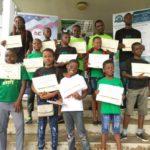
Fellow completes 2019 STEM training for youth in Cameroon
Fellow(s): Mpara Faith
Country: Cameroon
Cohort: 2017
Policy Area(s): Education Diplomacy/Mentoring, Empowering Women and Girls, Entrepreneurship, Professional Growth, Youth Engagement
Recently, 2017 fellow Mpara Faith concluded the 2019 program for ICT4KIDS, her training initiative that educates and empowers youth in Cameroon. Launched in 2018, ICT4KIDS brings STEM education and community development skills to children ages five to 18.
This year, Mpara was able to expand the program and offer two five-week sessions for participants, each attended by students from different regions and schools throughout Cameroon. Through lessons and lectures, team building exercises and pitch training, the sessions explored game development, graphic design, leadership and critical thinking. In the first session, the students developed their own games using Scratch technology, culminating in a game development competition with prizes for winning teams.
The program’s second session invited participants from ICT4KIDS’ inaugural training in 2018, and included additional lessons on Python programming, electronics, pitching and project implementation. The students had an opportunity to meet with Buea’s local Facebook Developers Circle, asking engineers and programmers questions about their careers. The five weeks concluded with students pitching an impact project that addressed an issue in their community. In one presentation, a student presented on bribery, outlining its causes, effects and her solutions to address it through education and advocacy.
Report Date...: 9/9/19
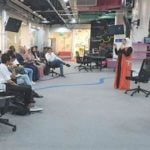
Fellow speaks about international exchange with graduates
Fellow(s): Ala’a Agha Karss
Country: Jordan
Cohort: 2017
Policy Area(s): Empowering Women and Girls, Professional Growth
This week, 2017 fellow Ala’a Agha Karss was invited to speak about international exchange programs with new college graduates in STEM fields. The event was hosted by IEEE, the world’s largest professional organization for electronic and electrical engineers, and was attended by graduates who are interested in pursuing international exchange opportunities.
In her session, Ala’a shared her TechWomen experience and spoke about how the program’s mission aligns with the attendees’ professional development goals. She also shared with them how to best prepare to apply for an exchange program abroad. “The ladies in attendance were so interested in exchange programs,” said Ala’a. “They became so excited to work on themselves in order to apply for the opportunity.”
Report Date...: 9/9/19

IIE collaborates with fellows’ initiatives for 2019 program
Fellow(s): Sabine El Kahi, Aiturgan Zulpukarova, Mide Ayeni
Country: Kyrgyzstan, Lebanon, Nigeria
Cohort: 2014, 2017
Policy Area(s): Empowering Women and Girls, Entrepreneurship, Youth Engagement
This year, IIE collaborated with three fellows to bring items from their initiatives to this year’s TechWomen company partners and speakers. Each product – wooden pens, fabric notebooks and wool business card holders – was handcrafted by participants in each fellow’s community-based initiative.
2014 fellow of Lebanon Sabine El Kahi supplied wooden pens from Kids Genius, her STEM-based initiative that spreads maker culture to young students. “The pens were made by our team with the help of three students with learning difficulties,” says Sabine. “Making the pens allowed them to learn, develop new skills and improve their confidence in their abilities.”
2017 fellow of Kyrgyzstan Aiturgan Zulpukarova is the founder of Kuragami, an initiative that works with women artisans in the Issyk-Kul region of Kyrgyzstan to make sustainable and ethically sourced products. Aiturgan supplied business card holders made of merino wool and naturally hand-dyed with walnut leaves. 2017 fellow of Nigeria Mide Ayeni supplied notebooks made from recycled paper and upcycled African ankara fabric made by women in Nigeria. Mide is the founder of Pearl Recycling, an initiative that collects waste such as plastic, car tires, newspapers and other recyclables and trains youth and women to transform them into furniture and upcycled items. All items will serve as gestures of appreciation for the companies and speakers that contribute to the 2019 program.
Report Date...: 8/26/19
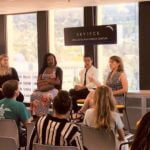
Mentor(s): Jill Finlayson (mentor)
Company: Women in Technology Initiative at UC Berkeley
Mentor Type: Impact, Professional
Policy Area(s): Empowering Women and Girls, Professional Growth
This week, longtime TechWomen mentor Jill Finlayson led a panel discussion alongside fellow women in tech at the Berkeley Skydeck, UC Berkeley’s startup accelerator and incubator.
The panel, sponsored by Silicon Valley Bank, brought together four women with diverse backgrounds and perspectives to discuss the role of women in technical fields. Throughout the event, the panelists shared the challenges they’ve faced in their roles in venture capital, healthtech and STEM non-profits. They also discussed strategies they’ve learned in navigating the tech landscape while promoting the equitable inclusion of women.
Jill is the director for the Women in Technology Initiative at UC Berkeley. Through her work, she creates best practices that promote the equitable participation and success of women in tech.
Report Date...: 8/19/19

Fellow teaches masterclass to young women in tech
Fellow(s): Natsai Mutezo
Country: Zimbabwe
Cohort: 2018
Policy Area(s): Empowering Women and Girls, Professional Growth
2018 fellow Natsai Mutezo recently held a masterclass for young women in Zimbabwe, sharing her perspective on thriving in a male-dominated field and achieving work-life balance.
The event, Girls Rock, aims to connect leaders in business and technology with young women to share advice and best practices. In her talk, Natsai, a chemical technologist and innovation consultant, spoke about her career highlights and challenges. She shared how she has navigated being a wife and mother while remaining ambitious in her career, emphasizing that women bring unique capabilities and strengths to their professional roles. “My biggest theme was to be your authentic self, as it was one of my biggest takeaways during TechWomen,” said Natsai. “I also highlighted that when you are doing what you do with passion, people will notice you.”
Report Date...: 8/19/19
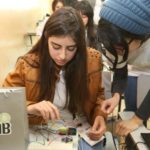
2018 seed grant winners implement community initiatives
Fellow(s): 2018 Seed grant-winning teams
Country: Kazakhstan, Lebanon, Nigeria, Rwanda, Zimbabwe
Cohort: 2018
Policy Area(s): Education Diplomacy/Mentoring, Empowering Women and Girls, Entrepreneurship, Professional Growth, Youth Engagement
TechWomen 2018 seed grant-winning teams from Rwanda, Lebanon, Zimbabwe, Kazakhstan and Nigeria have begun implementation of their impact projects that address leading challenges in their communities. Each team has written a guest post on the TechWomen blog that highlights their mission, progress and future goals.
Since TechWomen 2018, Rwandan team Healing Together has collaborated with community partners to train counselors on supporting women survivors of the Genocide against the Tutsi. In Lebanon, My ioLab is educating and empowering youth to scale up their IoT knowledge while addressing real-world issues. At hands-on workshops in Lebanon, Berlin, Singapore and Uzbekistan, the fellows have taught youth to address environmental issues in their community through innovative technology.
Through their initiative Vheneka/Khanyisa, fellows of Zimbabwe have traveled to schools, rural farming communities and prisons to train 525 women and girls on making reusable sanitary pads using sustainable materials. In Kazakhstan, the interactive website Uki.kz provides a safe space for domestic violence victims to gather resources and connect to professionals. Team Nigeria’s initiative, MAAMI, is addressing the maternal mortality rate by providing mobile education that connects women to safe and reliable healthcare. The fellows have a goal of onboarding 500 women, and have already registered 300 women to receive mobile health updates.
Report Date...: 8/12/19

